 NESTLÉ BOYCOTT
NESTLÉ BOYCOTT NESTLÉ BOYCOTT
NESTLÉ BOYCOTT"From Birth to Death"- would be the appropriate slogan for Nestlé. Nestlé first introduced industrial produced baby food to the market. Aggressive marketing for these baby nutrition followed in the countries of the southern hemisphere. Nestlé SA is engaged in the nutrition, health and wellness sectors. It is the holding company of the Nestlé Group, which comprises subsidiaries, associated companies and joint ventures throughout the world. It has such business units as Food and Beverage, Nestlé Waters and Nestlé Nutrition. Nestlé Group divides its products into nine categories: Prepared dishes and cooking aids, Beverages, Confectionery, Ice cream, Water, PetCare, Milk products, Nutrition and Pharma. It has numerous subsidiaries engaged in various areas of activity, including Alcon Ophthalmika GmbH (Austria), Alcon Bulgaria EOOD (Bulgaria) and Galderma Laboratorium GmbH (Germany) for pharmaceuticals; Novartis Nutrition GmbH (Austria) and Hjem-IS A/S (Denmark) for food and beverages, and Galderma International SAS (France) and Galderma Laboratorium GmbH (Germany) for health and beauty activities.
The main reasons to boycott Nestlé are:
International Nestlé Boycott
The International Nestlé Boycott is in effect in 19 countries. The boycott will continue until Nestlé ends its irresponsible marketing of breastmilk substitutes world-wide and abides by the International Code of Marketing of Breast-milk Substitutes and subsequent Resolutions in policy and practice. The Boycott is supported in the UK by over 100 church, health and consumer groups, over 90 businesses, 80 student unions, 17 local authorities, 12 trade unions, 74 politicians and political parties and many celebrities.
Nestlé and baby nutrition
 |
Nestlé holds about 50% of the world's breast milk substitute market and is being boycotted for continued breaches of the 1981 WHO Code regulating the marketing of breast milk substitutes. Nestlé encourages bottle feeding primarily by either giving away free samples of baby milk to hospitals, or neglecting to collect payments. It has been criticised for misinforming mothers and health workers in promotional literature. Nestlé implies that malnourished mothers, and mothers of twins and premature babies are unable to breastfeed, despite health organisations claims that there is no evidence to support this. Evidence of direct advertising to mothers has been found in over twenty countries such as South Africa and Thailand. Instructions and health warnings on packaging are often either absent, not prominently displayed or in an inappropriate language. All of these actions directly contravene the Code regulating the marketing of baby milk formulas. |
Nestlé and bottled water
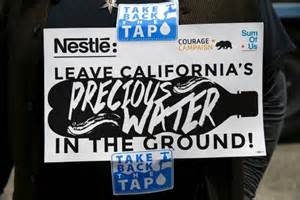 |
In 1992 Nestlé the Source Perrier SA Group, later known as Perrier Vittel water. In 1998 Nestlé took over Italy's leading bottled water producer, Sanpellegrino S.p.A. In the same year Nestlé launched Nestlé Pure Life, the first multi-site bottled water. In the United States and Europe, Nestlé sells mainly spring water with a designation of origin. In developing countries, however, the corporation pursues another concept -- namely Nestlé Pure Life. This product is purified groundwater, enriched with a Nestlé mixture of minerals. Nestlé Pure Life was the brainchild of Peter Brabeck, a former Nestlé CEO and currently Chairman of the Board. Nestlé Pure Life is a clever business concept. And particularly so in the developing world. In countries such as Pakistan where the public water supply has failed or is close to collapse, the company proudly presents its bottled water as a safe health-enhancing alternative. But for the overwhelming majority of consumers, it is an expensive out-of-reach alternative (See the Film "Bottled Life") In 2008 Nestlé Pure Life, has become in just a decade the world's leading bottled water brand, with 5 billion litres sold worldwide. Today Nestlé Pure Life is the world's top-selling brand of bottled water. |
Nestlé and rainforest destruction
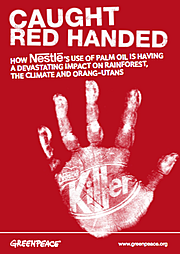 |
The Greenpeace report, "Caught Red-Handed: How Nestlé Use of Palm Oil is Destroying
Rainforests and the Climate" exposes how Nestlé is sourcing palm oil from suppliers in
Indonesia, which continue to expand into virgin rainforests and carbon-rich peatlands, including
habitat critical for endangered orangutans. Nestlé suppliers include the controversial
Sinar Mas group, Indonesia's largest producer of palm oil. Sinar Mas is breaking Indonesian law
and ignoring its commitments as a member the Round Table on Sustainable Palm Oil (RSPO).
Nestlé, the world's leading food and drink company, is a major consumer of palm oil.
In the last three years, its annual use has almost doubled, with 320,000 tons of palm oil
going into a range of products, including some of its most popular brands.
Nestlé is using palm oil from destroyed Indonesian rainforests and peatlands in popular
products like Nestlé Crunch, CoffeeMate, and PowerBar.
Nestlé has a long record of dealing with companies that have poor human rights records.
In February 2018, Nestlé has quietly announced that it will phase out its purchasing
of palm oil from the Guatemalan palm oil company REPSA. Since 2015, REPSA has been linked
to a massive spill of palm oil effluent into Guatemala's Pasion River
and to the killing of indigenous community leader Rigoberto Lima Cho.
Nestlé also profits from a lucrative joint venture partnerships with Indofood by
co-branding products in the South Asian market. Indofood is Indonesia's largest food company.
Indofood continues to sell RSPO certified, so-called "sustainable", palm oil produced by
children, unpaid women, and exploited workers.
Indofood also ignores the RSPO's guidelines on protecting precious orangutan habitat and
is guilty of logging on carbon-rich peat land, intensifying climate chaos.
|
Nestlé and forced child labor
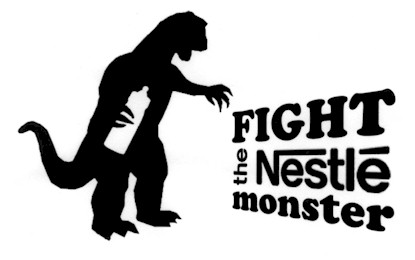 |
With an annual sales of over $65 billion, Nestlé SA is not only one of the world's largest manufacturers of chocolate products but according to Global Exchange, also the third largest exporter of cocoa from regions affected by forced child labor. As both a leading exporter of cocoa from the Ivory Coast and manufacturer of chocolate products for consumption around the world, Nestlé owes a special responsibility to consumers to ensure that its cocoa is no longer produced using forced and abusive child labor. In 2001, under pressure from the US congress, Nestlé and other major chocolate companies signed an agreement to end the problem - but little was achieved. In 2009, the U.S. Department of State estimated that there were still more than 109,000 children working in Ivory Coast's cocoa industry, and about 10 percent were victims of human trafficking or enslavement. Only in 2011 Nestlé decided to work with the Fair Labor Association (FLA) to investigate whether children are working on cocoa farms supplying its factories. A report released in 2012 by FLA, says it found "multiple serious violations" of the company's own supplier code. The code includes clauses on child labour, safety and working hours. FLA found that while Nestlé insisted their primary suppliers -- mostly big multi-nationals -- agree to their code, it often went no further, despite Nestlé knowing the supply chain involved many other stages. |
Nestlé and Fairtrade
Nestlé UK has announced its four-finger KitKat bar will be certified by Fairtrade in the United Kingdom and Ireland from January 2010. Fairtrade terms require buyers to commit to a minimum price of USD 1,600 a tonne but as world cocoa prices are currently (December 2009) above the price that Fairtrade certification guarantees (above USD 2,000 a tonne), there is little extra cost to the company.
The UK Fairtrade certification of KitKat is a CHF 110 million initiative of Nestléís to show their global commitment to promote sustainable cocoa production and support farmers and cocoa farming communities in Ivory Coast through The Cocoa Plan.
Two-finger KitKat bars and other Nestlé chocolate outside the scheme will continue to involve child slavery. Which raises the question, if Nestlé believes it is able to make these guarantees for the cocoa going into its Kit Kat, why has it not taken the action it promised in 2001 to end child slavery in its cocoa supply chain as a whole?
And we can learn from history: when Nestlé gained a Fairtrade mark for its Partners' Blend brand of coffee, this was used in a big US-wide advertising campaign. But just 0.02% of its coffee purchase was covered by the scheme, involving 0.1% of the farmers dependent on Nestlé.
Don't Buy Nestlé Until Nestlé Buys All Fair
Nestlé's position on gentechnology
This is an official quotation from the international Nestlé
Website: "With this vast experience, Nestlé recognises the potential gene technology has in the longer term to improve the quality, availability and nutritional value of food. Gene technology has the potential to increase food production and to support sustainable agricultural practices. In some instances, positive health effects have been confirmed. [...] Genetically modified crops, as all raw materials used by Nestlé, comply to strict regulatory and safety evaluations. WHO, FAO, OECD and numerous independent scientific bodies have concluded that genetically modified crops, including ingredients derived from them, that have passed food safety evaluation procedures, can be registered as safe for use in food production. Nestlé concurs with their shared opinion that such crops are as safe as their traditional counterparts.".
Though Nestlé strongly insisting on the use of gene technology in food production, in summer 1999 Nestlé was forced through a boykott initiated by german GREENPEACE to take the gentically modified chocolade bar "BUTTERFINGER" from the market. Consumers refused to eat this shit. BUTTERFINGER was designed as a test baloon for further genetically manipulated food. You still find transgenes in "FRISKIES Grand Menu" - dry food for cats. Bad luck for the cats, they can't make a noise. In January 2001 Nestlé took over RALSTON PURINA for US$10,3 billion and became the biggest producer of food for domestic animals.Lately Nestlé Germany said in a statement to Greenpeace: "We have found reliable producers for not genetically manipulated soye and maize food and we will use these traditional ingredients for Friskies Grand Menu and Friskies Matzinger.". But one has to be aware that Nestlé now controls a fifth part of the whole market for animal food in Europe.
Nestlé and Cosmetics
Nestlé own nearly 50% of the cosmetics company L'Oreal. L'Oreal was subject to boycott calls from animal rights groups including PeTA because of its animal testing policy. Since then L'Oreal has claimed that it no longer tests finished products on animals. This statement is obviously intended to mislead since finished products do not require further testing and it implies that the ingredients are certainly still subject to tests. Some groups called off the boycott in response to L'Oreals' claims, however there are individuals and organisations who continue the boycott and L'Oreal continues to test on animals.
 |
BEBA (baby milk food) |
 |
MAGGI |
| THOMY | |
 |
FINDUS (Sweden, Norway) frozen food belonged to Nestlé 1962-2000. In Italy, the brand is owned by Unilever. |
| WINIARY | |
| ALETE ALFARE NAN HA NANSOY NESLAC NESTOGEN PRENAN NIDO (baby food) | |
| SUNMARK Raisinets | |
 |
FRISCO MÖVENPICK (Switzerland) SCHÖLLER PUSH UP MELBA MOTTA MIVVI (ice-cream) |
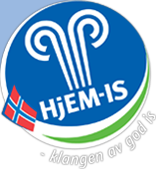 |
HEMGLASS (Sweden) ÅHUSGLASS (Sweden) HJEM-IS (Danmark, Norway) DIPLOM-IS (Norway) UNDERGROUND-IS (Danmark) (ice-cream) |
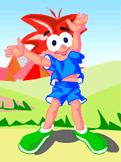 |
YOCO (joghurt) |
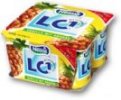 |
LC1 Joghurt |
 |
ROWNTREE MACINTOISH:
AFTER EIGHT , LION , ROLO (except USA) , QUALITY STREET , KITKAT , CARAMAC , SMARTIES , NUTS |
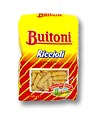 |
BUITONI (noodles) |
| CONTADINA (tomato and pasta products) | |
| CHAMBOURCY | |
| CROSS & BLACKWELL (sauces and soups) | |
| NESTLE ICE CREAM BARS | |
| YES (Germany) NIPS ORION (Czech Republic) PEPPERMINT CRISP PERUGINA POLO PRESTIGIO (Chile,Brazil) SNOWCAPS SUFLAIR (Brazil) TEXAN BAR TOFFEE CRISP (chocolate, confectionary) | |
| POWERBAR NESVITA | |
 |
MOUSSE AU CHOCOLAT NOIR |
| NESQUIK | |
 |
NESCAFE CARO TASTER's CHOICE HILL's BROS SANBORN ALTA RICA CAP COLOMBIE NESPRESSO PARTNER's BLEND RICOFFY ZOEGAS (coffee) |
| bottled water | |
| NESTEA | |
 |
VITTEL
AQUAREL
PERRIER
SAN PELLEGRINO
SAN BERNARDO
AQUA D'OR
CONTREX
VERA
UTOPIA
ZEPHYR HILLS
GREAT BEAR DEER PARK ARROWHEAD CALISTOGA ICE MOUNTAIN BUXTON KORPI OASIS OZARKA POLAND SPRING POWWOW PURE LIFE MINERE (mineral waters) |
| LIBBY's (juice and nectar) | |
| frozen pizza | |

DIGIORNO TOMBSTONE CALIFORNIA PIZZA KITCHEN
JACK'S DELISSIO
|
|
| cereals | |

CRUNCHY NUTS CLUSTERS FITNESS CHEERIOS NESQUICK CINI MINIS CHOCAPIC GOLDEN NUGGETS MILO CEREALS SHREDDIES TRIX
(cornflakes)
|
|
| pet food | |
| FRISKIES ALPO BENEFUL DOG CHOW FANCY FEAST FELIX GO CAT BUTCHERS (pet food) | |
| MIGHTY DOG BAKERS WINALOT GOURMET MON PETIT ONE PRO PLAN PURINA TIDY CATS (pet food) | |
| skin care - deodorants | |
| L'OREAL (Cosmetics) | |
| ALCON EYE CARE (Cosmetics) | |
| WARNER COSMETICS (Cosmetics) | |
| Note: According to Baby Milk Action,
the following Tesco own-brand
breakfast cereals are manufactured by Nestle; Corn Flakes, Bran Flakes, Puffed Rice, Sultana Bran, Cocoa Puffs, Cocoa Flakes. |